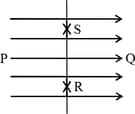Equipotential Surfaces
Equipotential Surfaces: Overview
This Topic covers sub-topics such as Equipotential Surfaces, Properties of Equipotential Surfaces, Equipotential Surfaces due to a Point Charge, Equipotential Surfaces in a Uniform Electric Field and, Equipotential Surfaces due to a Dipole
Important Questions on Equipotential Surfaces
Assertion: Two equipotential surfaces cannot cut each other.
Reason: Two equipotential surfaces are parallel to each other.
Assertion(A): Electric field is always normal to equipotential surfaces and along the direction of decreasing order of potential.
Reason (R): Negative gradient of electric potential is electric field.
Nature of equipotential surface for a point charge is
What is equipotential surface? Draw the equipotential surface due to point charge.
Draw an equipotential surface in a uniform electric field.
The current following through a pure inductor of inductance is ampere. What is .
The instantaneous values of current and voltage in an circuit are given by . Then
An electric field is directed along the tangent of an equipotential surface.
The equipotential surfaces due to a single isolated charge are concentric _____ surfaces.
Draw the equipotential surfaces due to an electric dipole. Locate the points where the potential due to the dipole is zero.
The equipotential surface of an electric dipole is
What is the angle between the electric field and the plane of an equipotential surface?
What will be the work done in moving a charge from one point to another point at a distance of on an equipotential surface?
What is the shape of equipotential surface for the following: A uniform electric field
Write two properties of equipotential surface.
Show that no work is done in moving a test charge from one point to other on an equipotential surface
What is meant by equipotential surface. Draw equipotential surfaces for a point charge
What is the shape of the equipotential surface for the following: A point charge.
The work done to move a unit charge along an equipotential surface from to
The points resembling equal potentials are

